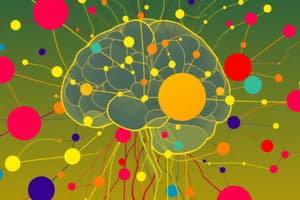Podcast
Questions and Answers
What type of knowledge is characterized by being universally true and not derived from sensory perception?
What type of knowledge is characterized by being universally true and not derived from sensory perception?
- Declarative knowledge
- Procedural knowledge
- A posteriori knowledge
- A priori knowledge (correct)
Which type of knowledge involves knowing how to perform tasks?
Which type of knowledge involves knowing how to perform tasks?
- Procedural knowledge (correct)
- Declarative knowledge
- A priori knowledge
- A posteriori knowledge
What is the purpose of a knowledge base (KB) in the context of reasoning?
What is the purpose of a knowledge base (KB) in the context of reasoning?
- To store universal truths only
- To contain facts and rules for rational inference (correct)
- To provide emotional insight for decision-making
- To act as a substitute for sensory information
Which of the following is a disadvantage of using natural languages for knowledge representation?
Which of the following is a disadvantage of using natural languages for knowledge representation?
What is a key limitation of using programming languages for knowledge representation?
What is a key limitation of using programming languages for knowledge representation?
In the statement 'If you work hard, then you will pass the course', what is the hypothesis?
In the statement 'If you work hard, then you will pass the course', what is the hypothesis?
What does the biconditional statement 'p ↔ q' represent?
What does the biconditional statement 'p ↔ q' represent?
What is the correct logical form for 'If the sun is shining and we win the toss, we will bat first'?
What is the correct logical form for 'If the sun is shining and we win the toss, we will bat first'?
In the logical expression '(a ∧ b) → (c ∨ (¬b → ¬c))', what does '¬b → ¬c' signify?
In the logical expression '(a ∧ b) → (c ∨ (¬b → ¬c))', what does '¬b → ¬c' signify?
Which of the following statements is an example of expressing natural language in logic?
Which of the following statements is an example of expressing natural language in logic?
What is a necessary component for a state-space search problem?
What is a necessary component for a state-space search problem?
What role does an admissible heuristic function play in A* search?
What role does an admissible heuristic function play in A* search?
How do informed search techniques differ from uninformed search techniques?
How do informed search techniques differ from uninformed search techniques?
What is the primary purpose of a Knowledge Base (KB)?
What is the primary purpose of a Knowledge Base (KB)?
In knowledge representation, what comes before knowledge?
In knowledge representation, what comes before knowledge?
What is a key characteristic of knowledge representation?
What is a key characteristic of knowledge representation?
What does the term 'intelligent behavior' in AI refer to?
What does the term 'intelligent behavior' in AI refer to?
What must occur before reasoning with knowledge can take place?
What must occur before reasoning with knowledge can take place?
What does modus ponens state?
What does modus ponens state?
What is a limitation of propositional logic?
What is a limitation of propositional logic?
Which statement best describes predicate logic?
Which statement best describes predicate logic?
In predicate logic, what does an atomic sentence consist of?
In predicate logic, what does an atomic sentence consist of?
What does the quantifier ∀ indicate in predicate logic?
What does the quantifier ∀ indicate in predicate logic?
Which of the following is an example of a predicate in predicate logic?
Which of the following is an example of a predicate in predicate logic?
What type of argument symbol is 'X' in the expression 'likes(X, chocolate)'?
What type of argument symbol is 'X' in the expression 'likes(X, chocolate)'?
Which of the following statements can be formulated using both logic connectives and quantifiers in predicate logic?
Which of the following statements can be formulated using both logic connectives and quantifiers in predicate logic?
What does the expression X P(X) represent in predicate logic?
What does the expression X P(X) represent in predicate logic?
Which rule can be inferred from the combinations provided: Rule 1: X (pious(X) prays(X)), Rule 2: X (prays(X) loves(allah, X)), Fact 1: pious(ali)?
Which rule can be inferred from the combinations provided: Rule 1: X (pious(X) prays(X)), Rule 2: X (prays(X) loves(allah, X)), Fact 1: pious(ali)?
What characteristic does predicate logic have that propositional logic does not?
What characteristic does predicate logic have that propositional logic does not?
In predicate logic, which statement correctly identifies the meaning of X P(X)?
In predicate logic, which statement correctly identifies the meaning of X P(X)?
What type of inference can be performed with the rule: if for all X, pious(X) implies prays(X) and we know pious(ali) is true?
What type of inference can be performed with the rule: if for all X, pious(X) implies prays(X) and we know pious(ali) is true?
Flashcards are hidden until you start studying
Study Notes
Knowledge Representation
- Knowledge emerges from data and information: Raw data becomes information when relationships between facts are identified. This information develops into knowledge when we understand patterns and relationships amongst those facts.
- Knowledge is crucial for intelligent behavior: It enables systems to make informed decisions and take appropriate actions based on an understanding of the world.
- Knowledge representation (KR) is a way to encode knowledge in a format that can be processed by a computer system. It's a substitute for the real-world entity itself.
- Knowledge is categorized into different types:
- A priori knowledge: Based on reasoning and logic; considered universally true. Example: All bachelors are unmarried.
- A posteriori knowledge: Verifiable through senses; may not always be reliable. Example: Some bachelors are very happy.
- Procedural knowledge: Represents knowledge about how to do something. Example: knowing how to find the tallest person by comparing their heights.
- Declarative knowledge: Represents knowledge about facts. Example: knowing that a specific person is a doctor.
- Knowledge representation is essential for reasoning and language:
- Knowledge Base (KB): A collection of facts and rules represented in a formal language.
- Reasoning: Processes that use the KB to draw conclusions and answer questions.
- Language: We need a suitable language to express knowledge and rules within the KB.
- Natural languages are not suitable for knowledge representation: They are too expressive and ambiguous, making it difficult for systems to understand and reason with them.
- Programming languages are not suitable for knowledge representation: While precise, they lack the expressiveness needed to represent complex knowledge.
- Formalisms are preferred for knowledge representation: Logic systems provide a structured and unambiguous way to express knowledge and reason with it.
Propositional Logic
- Propositional Logic: A system of logic that uses symbols to represent simple propositions (statements that can be true or false).
- Connectives: Combine propositions to create complex statements with logical meaning:
- Conjunction (∧): "and"
- Disjunction (∨): "or"
- Negation (¬): "not"
- Implication (→): "if...then"
- Biconditional (↔): "if and only if"
- Truth Tables: Define the truth value of complex propositions based on the truth values of their component propositions.
- Example: The statement "If the sun is shining, then we will play" can be represented in propositional logic: S → P, where "S" represents "the sun is shining" and "P" represents "we will play."
Predicate Logic
- Predicate Logic (First-Order Logic): Extends propositional logic to describe the properties of objects and relationships between them.
- Predicates: Represent properties or relations, taking arguments (constants, variables, or functions) as input.
- Example: "Ali is a student" can be represented as "student(Ali)."
- Quantifiers: Allow us to make statements about collections of objects:
- Universal quantifier (∀): "for all" example: ∀x loves(x, chocolate) (Everyone loves chocolate).
- Existential quantifier (∃): "there exists" example: ∃x loves(x, chocolate) (Someone loves chocolate).
- Inference Rules: Allow us to derive new conclusions from existing knowledge. Example: Modus Ponens:
- If A is true and A → B is true, then conclude B is true.
Predicate Logic Overcomes Limitations of Propositional Logic
- Expressiveness: Predicate logic is more expressive than propositional logic, allowing us to represent general statements and reason with quantification.
- Generalization: Predicate logic allows us to represent knowledge about classes of objects and relationships between them.
- Complex Statements: Predicate logic can represent complex relationships between objects, making it ideal for representing real-world knowledge.
Advantages of Knowledge Representation
- Formal Expression: Provides a formal language for expressing knowledge, ensuring precision and clarity.
- Automated Reasoning: Allows for automated reasoning and deduction, enabling systems to make inferences and draw conclusions.
- Knowledge Sharing: Facilitates the sharing and reuse of knowledge between different systems.
- Problem Solving: Provides a framework for representing and solving problems within a specific domain.
Examples of Knowledge Representation Systems
- Knowledge Base (KB) Systems: Designed to store and reason with factual knowledge represented in a structured format.
- Expert Systems: Designed to emulate the reasoning and decision-making capabilities of human experts.
- Semantic Networks: Use nodes and links to represent concepts and relationships between them.
- Ontologies: Formal descriptions of concepts and relationships within a specific domain.
- Frame-Based Systems: Use frame structures to represent concepts and their properties.
Choosing a Knowledge Representation System
- The choice of a knowledge representation system depends on the domain, the complexity of the knowledge, and the desired reasoning capabilities.
- Some considerations:
- Expressiveness: Can it represent all necessary knowledge?
- Efficiency: How efficient is reasoning within the system?
- Maintainability: How easily can the knowledge be added, modified, or deleted?
Studying That Suits You
Use AI to generate personalized quizzes and flashcards to suit your learning preferences.




